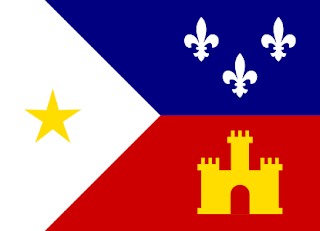
I am, obviously, a Cajun descended from the Acadians exiled from Acadia (modern Nova Scotia) in the 1750's. On this blog I mostly write about how I view religion and history, but a major part of who I am is my South Louisiana heritage. It is a cultural Gumbo, influenced by many that has grown out of the coming together of many cultures. Acadian, French, Spanish, African, German, etc.... The dominate culture was, until the mid 20th century, mostly Acadian/French with strong African/French undercurrents. Music is important part of our Culture.
Our native language (Cajun/Creole) was systematically attacked for most of the 20th century, until it has been almost destroyed. I know more French than most of my generation and I am very far from fluent. My parents, like most parent of my peers, did not teach us French, because they had been punished for speaking French and were made to be ashamed of the language when they attended school. If you spoke French on the school grounds, even if you knew no English, you were punished.
I pray and work for it's renaissance of our almost lost language.
Here are some links to examples of cajun/Creole Zydeco music on You Tube:
Here are some links to examples of cajun/Creole Zydeco music on You Tube:
Some more modern Cajun/Creole music:
This is just a very small sample of South Louisiana music. Laissez les Bon Temps Rouler
Coram Deo,
Kenith



